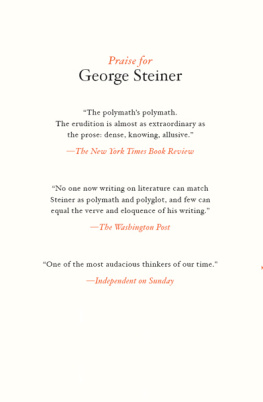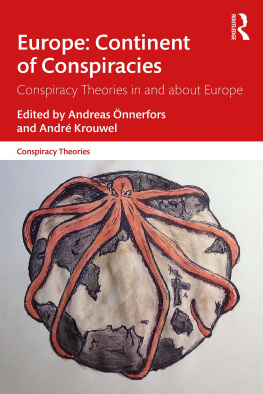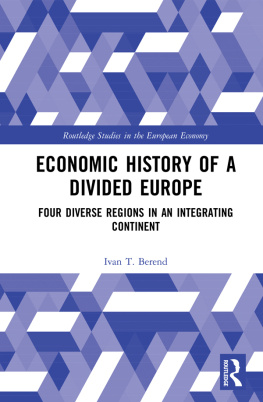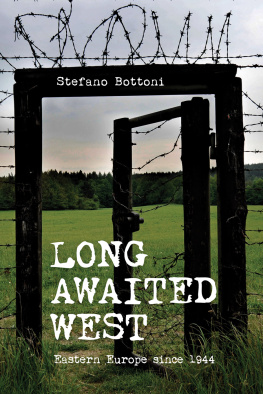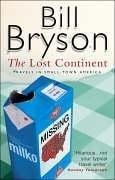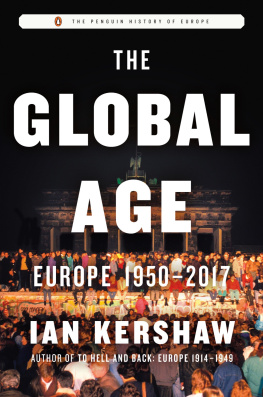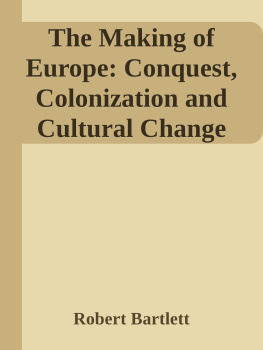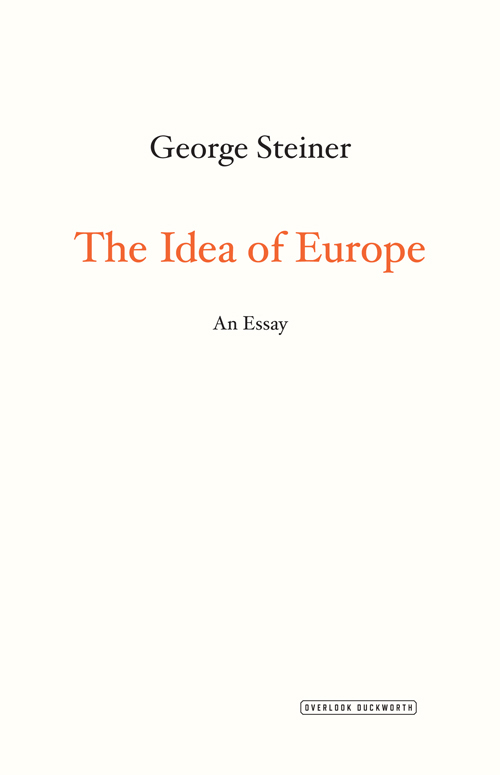This edition first published in the United States and the United Kingdom in 2015 by Overlook Duckworth, Peter Mayer Publishers, Inc.
N EW Y ORK:
141 Wooster Street
New York, NY 10012
www.overlookpress.com
For bulk and special sales, contact ,
or write us at the above address.
L ONDON :
30 Calvin Street
London E1 6NW
www.ducknet.co.uk
For bulk and special sales, please contact
, or write us at the above address.
Copyright 2004, 2012 Nexus Institute
All rights reserved. No part of this publication may be reproduced or transmitted in any form or by any means, electronic or mechanical, including photocopy, recording, or any information storage and retrieval system now known or to be invented, without permission in writing from the publisher, except by a reviewer who wishes to quote brief passages in connection with a review written for inclusion in a magazine, newspaper, or broadcast.
ISBN: 978-1-4683-1024-5
ISBN: 978-1-4683-1180-8 (e-book)
The Idea of Europe
An Essay
George Steiner
I n this remarkable work, a brilliant, cosmopolitan intellectual brings a lifetime of erudition to bear on a subject he has grappled with for decades and whose future is profoundly uncertain. Europe, George Steiner writes, is the place where Goethes garden almost borders on Buchenwald, where the house of Corneille abuts on the marketplace in which Joan of Arc was hideously done to death. It is, in other words, a continent rich with contradiction, whose many tensionscultural, social, political, economic, and religioushave for centuries conspired to pull it apart, even as it has become more and more unified.
George Steiner is at home in European culture, perhaps more so than anyone else. He thrives among the cafs and salons that hosted some of Europes greatest thinkers. The Idea of Europe uniquely reflects on the history of the continent and questions the future of its intellectual and moral code.
W HEN T HOMAS M ANN LEFT E UROPE IN 1938 TO SETTLE IN the United States, he made the remark, in all seriousness, at a press conference upon his arrival in New York: Wo ich bin, ist die deutsche Kultur. For many people, this statement was proof, yet again, of the world-famous authors arrogance. His brother Heinrich Mann, however, knew better. In his memoirs, Ein Zeitalter wird besichtigt, he begins the chapter Mein Bruder with the aforementioned anecdote, and then adds: Now we know what Goethes Faust meant when he said: Was du ererbt von deinen Vtern hast/ Erwirb es um es zu besitzen. Thomas Manns words, according to his older brother, were not an expression of arrogance, but of a deep sense of responsibility.
If there is anyone who, in Thomas Manns footsteps, has earned the right to say: Wherever I am, there is European culture, it is George Steiner. And if he were to make this statement, it would be, once again, not an expression of arrogance, but of a sense of responsibility.
* * *
The tenth Nexus Lecture is the prelude to a series of gatherings organized by the Nexus Institute, on the eve of the Intellectual Summit during the Dutch Presidency EU 2004, which will focus on the question of whether or not Europe is still such a good idea, and what the significance and political relevance of the European ideal of civilization actually is. The fact that George Steiner, more than anyone else, is at home in European culturewhich spans centuries, and is essentially cosmopolitanwas reason enough to invite him to give this lecture.
But there is another reason, one which is closely intertwined with the history of the Nexus Institute itself. The publication of the tenth Nexus Lecture would seem the perfect opportunity to tell the reader more about it.
P RIOR TO THE ESTABLISHMENT OF THE N EXUS I NSTITUTE IN 1994, the first issue of the journal Nexus had appeared in 1991. This journal would never have existed if it hadnt been for a friendship: the friendship between the renowned Amsterdam publisher Johan Polak and myself. Our innumerable conversations and letters about the necessity of founding a new journal always centered on one man, one book, and one other journal. That man was George Steiner, the book, his Language and Silence, and the journal, European Judaism. Johan was co-publisher of that journal, which was founded in the late sixties. Every now and then the international editorial board of European Judaism organized a conference. In 1969, a conference was organized in the city of Amsterdam, and Johan was the host. It was a memorable occasion, namely because of the unforgettable appearance by a forty-year-old, much-talked-about cultural philosopher: George Steiner. The position he took that day was as simple as it was horrifyingly true: Europe committed suicide by killing its Jews. The destruction of six million European Jews, the destruction of the world of Mahler, Alban Berg, Hofmannsthal, Broch, Kafka, Celan, Karl Kraus, Walter Benjaminthe list is endlesswas also the destruction of lesprit europen, the idea of Europe. With the loss of this idea, nothing remained of Europe but a cultureless, soulless, purely geographic and economic entity. However, the George Steiner who made this observation was also the man who had passed up an illustrious career in the United States. After the war and after completing his studies, he returned to Europe. So as not to allow Hitler and his sympathizers the last word; out of loyalty to an idea that must never die.
Johan Polak never forgot what George Steiner told us that day in Amsterdam. I mustve heard him say it a hundred times: George Steiner is right. Culturally, twentieth-century Europe is back in the Middle Ages. And just like the monasteries of that time, weve got to preserve our cultural legacy and hand it down through whatever channels we have. That explains Johans formidable private library, his publishing house, and his bookshop: Athenaeum, on the Spui in Amsterdam. That is also why our journal Nexus had to be created: to serve European culture, the European ideal of civilizationalthough for the handing down of a cultural legacy Nexus could never be more than a very small channel.
I N 1934, T HOMAS M ANN HAD TO WRITE AN OBITUARY for a man who had always been like a father to him: Sammi Fischer, his Hungarian Jewish publisher in Berlin, the man who, to a considerable extent, had made his authorship possible. Mann recalled the following exchange, during his last meeting with the old manwho was already very illseveral months before. Fischer expressed his opinion about a mutual acquaintance:
Kein Europer, sagte er kopfschttelnd.
Kein Europer, Herr Fischer, wieso denn nichts?
Von groen humanen Ideen versteht er nichts.
The great humane ideas. That is European culture. That is what Mann had learned from his teacher, Goethe. And Goethe himself, in his autobiography Dichtung und Wahrheit, indicates as a date of birth of this European humanism: October 25, 1518. On that day the scholar and humanist Ulrich von Hutten wrote a letter to his friend Willibald Pirckheimer, in which he explained that although he was of noble birth, he didnt wish to be a nobleman without having earned it: Nobility by birth is purely accidental, and therefore meaningless to me. I seek the wellsprings of nobility elsewhere, and I drink from that source. Here, once again, we can witness the birth of nobilitas literaria: true nobility is the nobility of the spirit. The arts, the humanities, philosophy and theology, beauty; each exists to ennoble the spirit, to enable mankind to discover and claim ownership of its highest form of dignity. It is the cultural legacy, the major works by poets and thinkers, artists and prophets, which a person must make use of for

